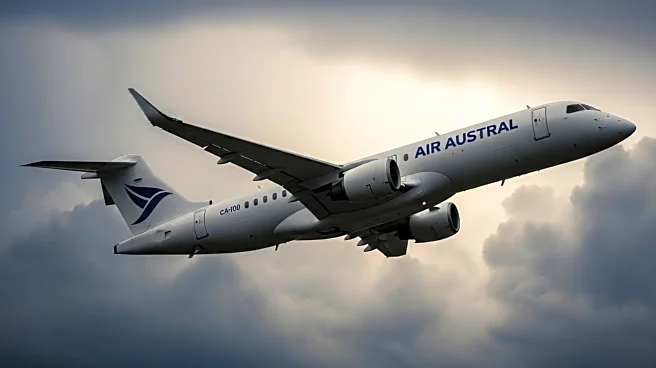What's Happening?
Air Austral, a regional airline based in the French overseas department of Reunion, has decided to retire its fleet of Airbus A220-300 aircraft. This decision follows persistent technical problems with the Pratt & Whitney PW1500G geared turbofan (GTF) engines that power these planes. The airline has faced recurring reliability issues over the past four years, leading to the grounding of two out of its three A220s. The problems stem from defects in the engines, linked to contaminated powdered metal used during manufacturing, which can cause corrosion and cracking. These issues have necessitated extensive engine inspections and repairs, affecting airlines globally. Air Austral was the first carrier in the Indian Ocean region to introduce the A220, using them primarily for short- and medium-haul routes to destinations like Madagascar, Mauritius, and South Africa.
Why It's Important?
The retirement of the A220 fleet by Air Austral highlights significant challenges faced by airlines operating these aircraft, particularly in regions with harsh climates. The technical issues with the Pratt & Whitney GTF engines have broader implications for the aviation industry, as they affect operational reliability and financial stability. Airlines operating in similar environments may face increased maintenance costs and operational disruptions, potentially influencing their fleet management strategies. The decision also underscores the importance of engine reliability in maintaining service levels and customer satisfaction. For Pratt & Whitney, this situation may prompt further scrutiny and pressure to resolve the manufacturing defects and improve engine performance.
What's Next?
Air Austral plans to continue operating its widebody fleet, which includes Boeing 777-300ERs and 787-8s, for long-haul routes to mainland France and Asia. The airline's decision to retire the A220s may lead to a reevaluation of its fleet strategy, potentially exploring alternative aircraft models that offer greater reliability. For Pratt & Whitney, addressing the engine defects remains a priority to restore confidence among airline operators. The broader aviation industry will likely monitor the situation closely, as similar issues could impact other carriers using the same engine technology.










